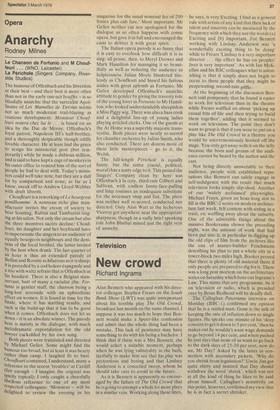New crowd
Richard Ingrams
Alan Bennett who appeared with his director colleague Stephen Frears on the South Bank Show (LW!') was quite unrepentant about his terrible play The Old Crowd, broadcast last month on the same channel. I suppose it was too much to hope that Bennett would make a Speer-like confession and admit that the whole thing had been a mistake. This lack of penitence may have something to do with his being a bachelor.! think that if there was a Mrs Bennett, she would select a suitable moment, perhaps when he was lying vulnerably in the bath, tactfully to make him see that his play was pretentious and boring and that Lindsay Anderson is a conceited twerp, whom he should take care to avoid in the future.
As it is Bennett is apparently so encouraged by the failure of The Old Crowd that he is going to attempt a whole lot more plays in a similar vein. Working along those lines, he says, is very Exciting. I find as a general rule with artists of any kind that their lack of talent and sincerity can be measured by the frequency with which they use the words (a) Exciting and (b) Important. For Bennett working with Lindsay Anderson was 'a wonderfully exciting thing to be doing' while to Frears 'Lindsay is a very important director . . . the effect he has on peoples' lives is very important'. As with Ian McKellan and his RSC colleagues what is astonishing is that it simply does not begin to occur to these people that they might be perpetrating second-rate piffle.
At the beginning of the discussion Bennett said pompously that he found it easier to work for television than in the theatre while Frears waffled on about 'picking up casual bits of life and then trying to build them together', adding that it seemed to work on television. The point they don't want to grasp is that if you were to put on a play like The Old Crowd in a theatre you would be unceremoniously hooted off the stage. You only get away with it on the telly because the boos and groans of the audience cannot be heard by the author and the cast.
Not being directly answerable to their audience, people with established reputations like Bennett can safely engage in self-indulgences with the result that much television looks simply slip-shod. Another of our 'widely acclaimed' playwrights, Michael Frayn, given an hour-long slot to fill in the BBC-2 series on modern architecture last week, felt content with sitting in a train, etc waffling away about the suburbs. One of the admirable things about the massive Bookerama shown the preceding night, was the amount of work that had been put into it, in particular in digging up the old clips of film from the archives like the one of master-builder Frischmann describing his plan to put a whole city in a tower-block two miles high. Booker proved that there is plenty of old material there if only people are prepared to dig for it. There was a long post mortem on the architecture series on Saturday which bore out Ingrams's Law. This states that any programme, be it on television or radio, which is presided over by Brian Redhead will be deadly dull.
The Callaghan Panorama interview on Monday (BBC-1) confirmed my opinion that he is a rattled man. Gone is the talk of keeping the rate of inflation down to single figures. He speaks one minute of his 'deep concern to get it down to 5 per cent,' then he makes out he wouldn't want wage demands to go beyond 14 per cent, and when pushed he just says that none of us want to go back to the dark days of 25-30 per cent, now do we, Mr Day? Asked by the latter in connection with secondary pickets, 'Why do you shrink from legislation?' Uncle Jim got quite shirty and insisted that Day should withdraw the word 'shrink', which was not at all the kind of thing he likes to be said about himself. Callaghan's sensitivity on this point, however, confirmed my view that he is in fact a secret shrinker.


































 Previous page
Previous page